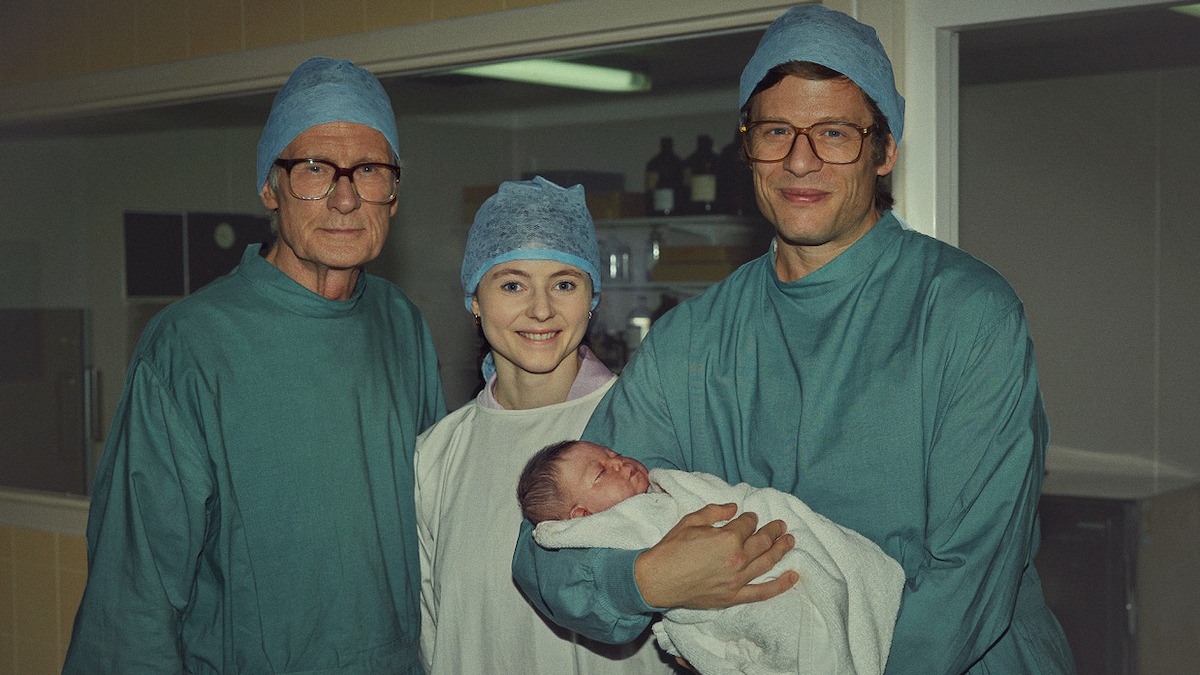
Bill Nighy, Thomasin McKenzie and James Norton are cast in director Ben Taylor’s film that tells the story of the innovators who made in-vitro fertilisation a reality in Joy: The Birth of IVF. Photo: Supplied.
In 1978, the birth of Louise Brown, whose middle name was Joy, was lauded as being among “the most remarkable medical breakthroughs of the 20th century”. Following a procedure pioneered in Britain, Brown was the first human born on 25 July after conception by in-vitro fertilisation.
Joy: The Birth of IVF is more than just being about a medical pioneering procedure. It’s also about sexism in science.
While the legacy of these three British pioneers — Jean Purdy, Robert Edwards and Patrick Steptoe — is long-lasting, this film delves deeper, and also highlights how they aspired to give people the option if they did want children and couldn’t have them naturally. It also chronicles the uphill journey faced by these innovators.
The scientists and researchers fundamental to this story are: Dr Robert Edwards (James Norton, Happy Valley, Mr. Jones, Mr Turner), Jean Purdy (Thomasin McKenzie, Leave No Trace, Eileen, Old) and Dr Patrick Steptoe (Bill Nighy, Living, About Time, Emma).
The threesome face resistance from society as well as other scientists including the Medical Research Council and James Watson, the Nobel prize-winning scientist for his discovery of the DNA structure.
It was nurse and embryologist Jean Purdy, who was instrumental in the development of IVF, but wasn’t officially acknowledged until nearly four decades after her death. Once Steptoe and Purdy had passed away, it was Edwards who was awarded the Nobel Prize for the trio’s fertility innovations in 2010.
It also focuses on the forgotten — and commonly unrecognised — role played by Purdy in creating the first-ever IVF baby. Even though she was an essential part of the team that made it all possible, Purdy was ignored in the history of IVF for a long time. We can see how she faces severe endometriosis, which means she is not able to have children.
While Joy is truthful and faithful to the real-life events of the team’s pursuit in creating IVF, it’s also about being unnoticed and sidelined in science, of the implied and often obvious sexism and prejudice against women.
The story is a revelation of real events in the 1960s and 1970s in which Nighy plays the innovative obstetrician and gynaecologist Patrick Steptoe, and Norton portrays the visionary scientist Robert Edwards. All three credibly depict a fascinating personal story, alongside their struggle to develop IVF — against all odds!
The human angle behind IVF makes for a heart-touching realisation. The trailblazers faced opposition from the church, state, media and medical establishment in their pursuit of the world’s first “test-tube baby”. Perceptions were coated with resentment and wonder.
Screenwriter Jack Thorne and director Ben Taylor effectively dramatise the stress, anguish and triumph that led to a brilliant medical development. From the first time he heard about the script, Taylor (Sex Education, Catastrophe, Cardinal Burns) wanted to direct this film. He had benefited from this technology that had made the “impossible possible”.
“I needed to do the job because IVF has been a huge part of my life over the last 10 years,” Ben said. “I was desperate to be a part of it, if possible.”
Also having ties with IVF, through their children, are the film’s executive producer Jack Thorne (The Swimmers, Enola Holmes, Radioactive) and the screenwriter, Rachel Mason, who is his wife.
While Edwards and Steptoe received most of the acclaim for their scientific innovation, the core of Joy is Purdy, who serves as the study’s irrefutable mainstay and a point of reassurance to the women who submit themselves for research.
According to Ben Taylor, there were reasons for the lack of accolades for Purdy.
“I think the acknowledgment of a woman’s involvement in what was considered a man’s world is still something that is out of balance but was stark with the three of them,” Ben said.
“You see the newspapers of the time and everything is about Patrick and Bob — there was never anything written about Jean. That was obviously a gender issue, but also it was the lack of understanding of the contribution that Jean made to this, which was an incredibly human edge.”
With Joy: The Birth of IVF, Taylor makes his feature film debut, and gives Purdy her much-overdue credit, bringing to light the story of how three British visionaries brought hope to families who longed for children.
Although ethical and moral questions still abound with IVF in ways that were unanticipated by its inventors, there’s no denying its transformative revolutionary powers. Thanks to IVF, more than 10 million children have been born worldwide since 1978!
Joy: The Birth of IVF, directed by Ben Taylor, is streaming on Netflix


